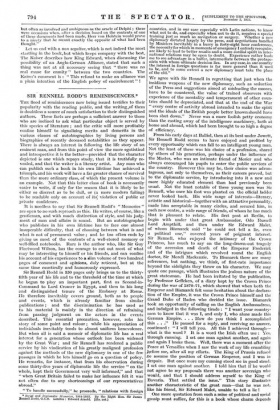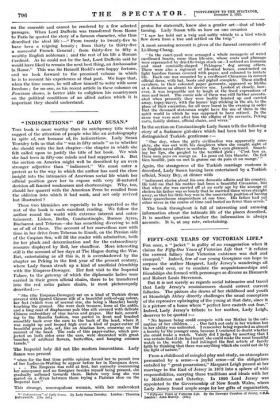SIR • RENNELL RODD'S REMINISCENCES.* Tim flood of reminiscences now being
issued testifies to their popularity with the reading public, and the writing ,of them is doubtless a source of much satisfaction to their distinguished authors. These facts are perhaps a sufficient answer to those who are inclined to ask what particular object is served by this species of literature ; and the critic will more profitably confine himself to signalizing merits and demerits in the various classes of autobiographies by living persons and biographies of recently deceased notabilities as they appear. There is always an interest in following the life story of an eminent man, and from this point of view the more egotistical and introspective it is the better—provided that the character depicted is one which repays study, that it is truthfully re- vealed, and that the writer is a literary artist. Any man who can publish such a book in his own lifetime has achieved a triumph, and his work will have a far greater chance of survival than the more ordinary class, of which the present volume is an example. Not that this latter class of book is necessarily easier to write, if only for the reason that it is likely to be either so discreet as to be dull, or (a more modern failing) to be readable only on account of its violation of public or private confidence.
It is needless to say that Sir Rennell Rodd's " Memories " are open to no such reproach as this. He writes, of course, like a gentleman, and with much distinction of style, and his judg- ment of men and affairs is sound. But an autobiographer who publishes in his own lifetime has to face one almost insuperable difficulty, that of choosing between what is and what is not of permanent value ; and he too often ends by giving us most of the contents of a well-stored memory or well-filled notebooks. Rare is the author who, like Sir Guy Fleetwood Wilson, has the courage to cut out most of what may be interesting to himself or his friends, and can confine his account of his experiences to a slim volume of two hundred pages of comment and opinions, duly reticent, but at the same time caustically and humorously expressed.
Sir Rennell Rodd in 850 pages only brings us to the thirty- fifth year of his life and to the threshold of the time at which he began to play an important part, first as Second-in- Command to Lord Cromer in Egypt, and then to his long and distinguished tenure of the Embassy at Rome. He therefore inevitably covers ground, both as to people and events, which is already familiar from similar publications ; and the discrimination he has used as to his material is mainly in the direction of refraining from passing judgment on the actors in the events described. This essential precaution, however, robs his story of some point and colour ; while his appreciation of individuals inevitably tends to almost uniform benevolence. But when all is said a memoir of diplomatic life has a real interest for a generation whose outlook has been widened by the Great War ; and Sir Rennell has rendered a public service by his vindication of his greatly maligned profession against the methods of the new diplomacy in one of the few passages in which he lets himself go on a question of policy. He remarks, for instance, that from his observation during some thirty-five years of diplomatic life the service "on the whole, kept their Government very well informed," and that "when Great Britain failed to make her influence felt it was not often due to any shortcomings of our representatives abroad."
"To handle successfully," he proceeds, "relations with foreign • Social and Dip?omatie Memories, 1884-1893. By the B.Igbt Hon. Sir Jamea Hamel' Raid, G.C.B. London : Edivezd Arnold. 121e. net.] countries, and in our case especially with Latin nations, to know what not to do, and especially when not to do it, requires a special training Just as much as navigation or surgery. Whether a new diplomacy dictated largely by the press, and negotiations handled by Ministers inevitably in a hurry in forty-eight hour conferences, the necessity for which in moments of emergency I entirely recognize, are likely to lead to better results and a more cordial spirit in inter- national relations may be open to doubt. Experience rather leads me to see advantage in a buffer, intermediate between the protago- nists with whom ultimate decision lies. In any case, in our country the interest in foreign questions is far more general than it used to be, and to some extent a new diplomacy must take the place of the old."
We agree with Sir Rennell in regretting that just when the insidious weapons of the new diplomacy, such as seduction of the Press and suggestions aimed at misleading the masses, have to be countered, the value of trained observers with experience of the mentality and temperament of other coun- tries should be depreciated, and that at the end of the War "every centre of activity abroad intended to make the spirit and the ideals of the British people better known should have been shut down." Never was a more foolish petty economy than the casting away of the intelligence machinery, both at home and abroad, which had been brought to so high a degree of efficiency.
From his early days at Balliol, then at its best under Joweft, Sir Rennell Rodd seems to have enjoyed and profited by every opportunity which can fall to an intelligent young man. Not the least of these was his choice of a profession, shared by others of his generation, perhaps under the influence of the Master, who was an intimate friend of Morier and who always encouraged his pupils to enter the public services of the country. However this may be, their choice was advan- tageous, not only to themselves, as their careers proved, but to the diplomatic service, by introducing into it a new and more highly educated element than had previously been usual. Not the least notable of these young men was Sir Rennell, who once his foot was planted on the official ladder never looked back. His wide range of interests—literary, artistic and historical—together with an attractive personality, made him acceptable in many circles, and secured him, in each new centre, a wide range of friends, of whom he has much that is pleasant to relate. His first post at Berlin, to begin with under that great Ambassador, Odo Russell Lord Ampthill, and then under Sir Edward Malet, of whom Bismarck said "he could not tell a lie, even a political one," covered years of poignant interest. Sir Rennell, who enjoyed the intimacy of the Crown Princess, has much to say on the long-drawn-out tragedy of the accession and death of the Emperor Frederick and of the intrigues which revolved round the English doctor, Sir Morel Mackenzie. To Bismarck there are many references, but nothing, we think, of first-rate importance beyond the sidelights they throw on his character. We may quote one passage, which illustrates the jealous nature of the great statesman. He had been irritated by the publication, by Professor Geffcken, of a diary kept by the Crown Prince during the war of 1870-71, which showed that when both the Emperor and Bismarck felt some hesitation about the declara- tion of the Empire, it was the Crown Prince himself and the Grand Duke of Baden who decided the issue. Bismarck took an opportunity of calling on the English Ambassadress, and indulged in the following tirade : "I want your country- men to know that it was I, and only I, who alone made this German Empire. . . . How do you think I accomplished -this . . ." He paused for a reply, and receiving no answer, continued : "I will tell you. All this I achieved through— what is the word ? It is a word the Irish often use : Yes, through cunning. I set one man against another, and again and again I broke them. Well, there was a moment after the Peace at Versailles when I saw the work of my life crumbling before me, after all my efforts. The King of Prussia refused to assume the position of German Emperor, and I was in despair. But once more my cimning stood me in good stead. I set one man against another. I told him that if he would not agree to my proposals there was another sovereign who would, and that I should address myself to the King of Bavaria. That settled the issue." This story illustrates another characteristic of the great man—that he was not, like his friend, Sir Edward Malet, unable to tell a lie!
One more quotation from such a mine of political and social gossip must suffice, for this is a book whose charm depends on the ensemble and cannot be rendered by a few selected passages. When Lord Dufferin was transferred from Rome to Paris he quoted the story of a famous character, who thus described the ideal life :—`• From twenty to twenty-five to have been a reigning beauty ; from thirty to thirty-five a successful French General ; from thirty-five to fifty a. wealthy English nobleman ; and the rest of his life a Roman Cardinal. As he could not be the last, Lord Dufferin said he would have liked to remain the next best thing, an Ambassador in Rome." This was Sir Rennell Rodd's own happy fortune, and we look forward to the promised volume in which he is to recount his experiences at that post. We hope that, when the time comes, he will allow himself to write with some freedom ; for no one, as his recent article in these columns on Fascisnzo shows, is better *able to enlighten his countrymen on the political conditions of an allied nation which it is important they should understand.







































































 Previous page
Previous page